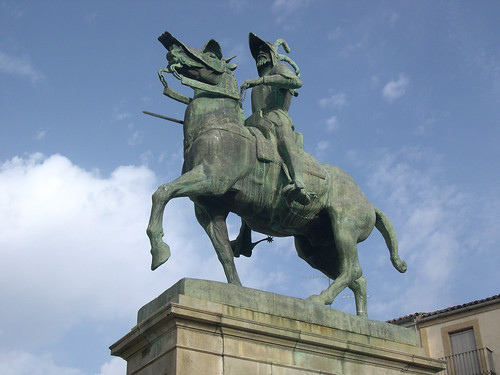Pronouncing Don Quixote in La Mancha
- 09 Nov 2016
- 07 Mar 2023

Pizarro in the market square of Trujillo, Spain
On holiday in Spain in 2007 I read Don Quixote — and ploughing through some parts in the Don’s homeland, the region of La Mancha, I thought I’d solved the puzzle of the protagonist’s name: Key-Ho-Tay or Kwiksot?
I’ve previously spoken the name ‘Don Quixote’ as Don Key-ho-tay, presuming it was more Spanish, though of course I’ve been aware of the alternative inEnglish of Don Quick-Sot. The version of the novel I had, the translation by John Rutherford (winner of the 2002 Primo Valle Inclàn Prize) definitely plumps for Kwiksot in its rhymes. For example, on page 222 (Chapter XXVI) of the paperback, he translates a poem to read:
Enough to fill the biggest pot
Are tears of doleful Don Quixote
…
And when it touched his tender spot
Tears flowed from doleful Don Quixote
So there seems to be no confusion there. Rutherford is rhyming with ‘pot’ and ‘spot’. My previous assumption that the pronunciation was Key-ho-tay was a mistake, an affectation I’d adopted because I thought it sounded more foreign.
But hang on a moment. Checking the Spanish equivalent I find it reads:
‘Y en tocándole el cogote,
Aquí lloró Don Quijote’
— El Ingenioso Hidalgo de Don Quijote de la Mancha. Capítulo XXVI
Quijote, it turns out, is the modern Spanish rendition, after spelling reforms — Quixote is the spelling in medieval Castilian — and according to Yahoo’s Spanish Dictionary: translation of cogote, ‘cogote’ is pronounced Koggo-tay.
Which would mean that Quixote is said Key-Ho-Tay after all.
It appears that Rutherford’s translation is cleverly making allowance for a traditional English mispronunciation. For instance, on another page his translation reads,
‘…Don Biscuit, or Don Fixit, or Don Riskit’. ‘Don Quixote he must have said, Lady,’ Sancho interrupted
Which carries through the Quick-Sot pronunciation. And as Wikipedia points out, traditional English rendering is also preserved in the pronunciation of the adjectival form quixotic.